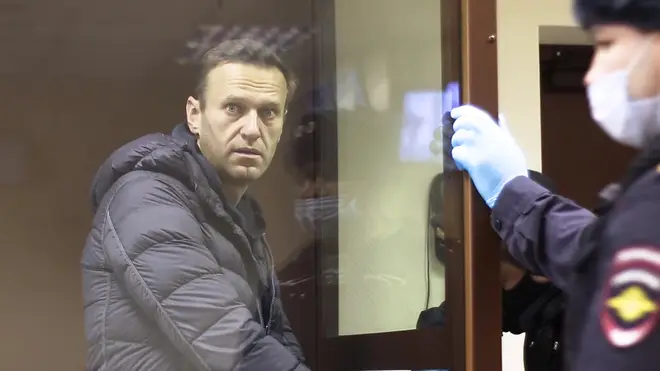
Henry Riley 7pm - 10pm
5 February 2021, 13:14

Alexei Navalny attacked the new hearing as a ‘disgusting PR trial’.
Russian opposition leader Alexei Navalny has appeared in a Moscow court for the second time this week – on a charge of insulting a Second World War veteran.
The politician, who on Tuesday was ordered to two years and eight months in prison, attacked the new hearing as a “disgusting PR trial” intended by the Kremlin to discredit him.
Last June, Russia’s Investigative Committee launched an investigation into Mr Navalny on charges of defamation after the politician criticised people featured in a video promoting the constitutional reform that allowed an extension to President Vladimir Putin’s rule as “corrupt stooges”, “people without conscience” and “traitors”.
The authorities maintained that Mr Navalny’s comments “denigrate (the) honour and dignity” of a veteran featured in the video. If convicted, Mr Navalny faces a fine or community service.

“This trial was conceived as some kind of PR trial, because the Kremlin needs headlines, ‘Navalny slandered a veteran’,” the politician said in the courtroom on Friday.
Last month, the 44-year-old anti-corruption investigator and Mr Putin’s most prominent critic was arrested upon returning from Germany, where he spent five months recovering from a nerve-agent poisoning that he blames on the Kremlin. Russian authorities have rejected the accusations.
A Moscow court on Tuesday found that Mr Navalny violated probation terms of his suspended sentence from a 2014 money-laundering conviction, and ordered him to serve two years and eight months in prison.
The politician’s arrest and jailing triggered massive protests across Russia, in which tens of thousands took to the streets to demand his release.
Many protesters also chanted slogans against Mr Putin in the largest show of discontent in years. Thousands of protesters have been detained.
Russia: Remarks by HR/VP @JosepBorrellF at the joint press conference with Foreign Minister Lavrov 👇 https://t.co/TXMm22PDOM pic.twitter.com/4Y9abuyVHi
— European External Action Service – EEAS 🇪🇺 (@eu_eeas) February 5, 2021
The European Union’s top diplomat told Russia’s foreign minister on Friday that the treatment of Mr Navalny represents “a low point” in relations between Brussels and Moscow.
EU foreign affairs chief Josep Borrell met Sergey Lavrov after saying: “Certainly, our relations are under a severe strain, and the Navalny case is a low point in our relations.”
After the meeting, Mr Borrell said he had relayed to Mr Lavrov his concerns over Mr Navalny’s jailing and the arrests of thousands of people, and communicated the bloc’s support for Mr Navalny’s release and an investigation of the August poisoning,
Mr Lavrov again accused European officials of refusing to share evidence of the poisoning.